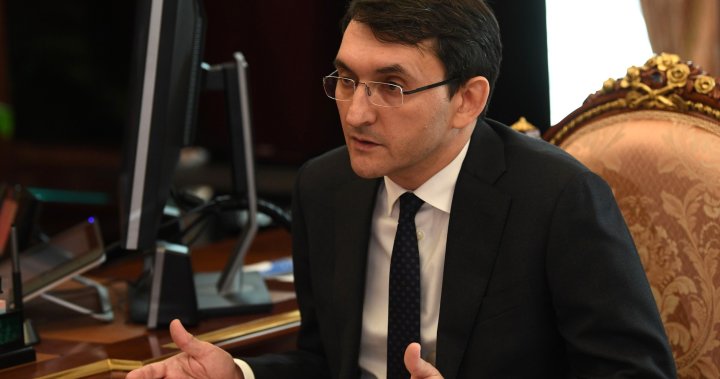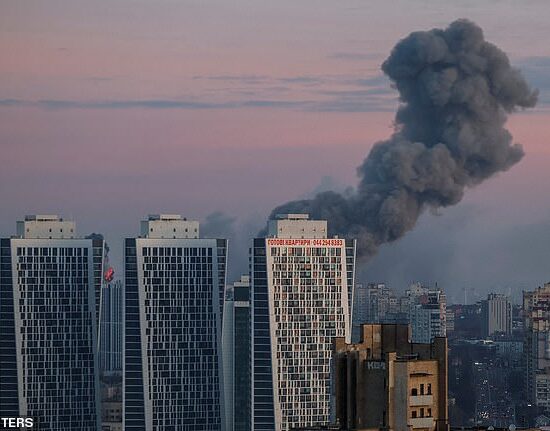
The March edition of the Macdonald-Laurier Institute magazine, Inside Policy, called Russia’s invasion of Ukraine criminal, unprovoked, unjustifiable, and aggressive.
An Ottawa-based think tank made up of academics, activists and former diplomats and politicians, the MLI has been a leading voice against the Russian war in Ukraine.
Two weeks ago, President Vladimir Putin’s government hit back: it blocked the MLI website in Russia and ordered the company that hosts it to shut it down.
A report obtained by Global News shows Putin’s censorship czar contacted the web host on April 11, claiming the MLI site was “in violation of the law.”
The legal threat was sent by Roskomnadzor, the Russian Federation’s mass media and internet regulator, the report prepared by the hosting platform shows.
It referred to “a violation of the procedure for disseminating information” and said the request was from the Prosecutor General of the Russian Federation.
The company was given 24 hours to “delete” the website.
Fourteen months into his disastrous assault on Ukraine, Putin appears to be escalating his information war, targeting not only opponents at home but also those abroad.

According to the Russian website Roskomsvoboda, on the same day Moscow blocked the MLI, it took the same action against other Western think tanks critical of Putin, including Britain’s storied Chatham House and the Woodrow Wilson Center in the U.S.
A leading expert on digital repression, Andrei Soldatov, said that while the Kremlin was previously concerned about Russian-language sources, it now appeared to be going after those published in English as well.
“It means the Russian censors are expanding their efforts to control the narrative about Russian government activities,” said Soldatov, a Russian journalist.
Russian president Vladimir Putin, left, meets with his censorship czar Andrei Lipov, Aug. 10, 2020.
Russian Government
Roskomnadzor, Russia’s Federal Service for Supervision of Communications, Information Technology and Mass Media, did not specify what about the MLI website it considered illegal.
But Putin has tightly controlled what Russians can see and hear about the war in Ukraine, allowing his state media to spread disinformation while jailing voices of dissent.
The information campaign has focused mostly on silencing domestic opposition, but Putin has also begun reaching beyond his borders to target international critics of his invasion.
“We denounce censorship and are disappointed that access to Chatham House analysis has been blocked, apparently by the Russian state, thus preventing people from reading and reaching their own conclusions,” the London-based organization said in a statement to Global News.
The Director General of the Atomic Energy Agency, Rafael Marino Grossi speaking at Chatham House in London, Tuesday, Feb. 7, 2023. (AP Photo/Alastair Grant).
AG
Leading the effort is Roskomnadzor, which is headed by Andrei Lipov, a Putin bureaucrat who has been sanctioned by Canada for his role in the Ukraine war. Roskomnadzor is also on Canada’s sanctions list.
According to the European Union, which has similarly sanctioned Lipov, Roskomnadzor “is a central instrument in the execution of censorship and repression of free media in Russia.”
“As the head of Roskomnadzor, Mr Lipov is responsible for decisions that have led to the censorship and closure of independent Russian media. These actions create a censored information space that promotes, aids and condones the Russian armed aggression against Ukraine,” the EU wrote.
The U.S.-based web hosting company, WPMU Dev, did not comply with Roskomnadzor’s notice about the Macdonald-Laurier Institute website. Instead, it informed the MLI it was being targeted.
The next day, however, the MLI site was blocked in Russia, along with those of policy think tanks in Britain, the United States and Europe that have written about Putin’s invasion of Ukraine.
“The complaint is an attempt to silence MLI through extraterritorial application of Russian law. Thankfully, Russian censorship has no legal authority in Canada whatsoever,” the Institute said in a statement.

The Macdonald-Laurier Institute was blacklisted by Russia in 2022, along with senior fellows such as Marcus Kolga, Sarah Teich and Shuvaloy Majumdar.
But Kolga said Russia’s targeting of the hosting platforms of websites that challenge Putin’s official narrative marked an intensification. “I have not heard of this before, so this is completely new,” he said.
A leading critic of Russian disinformation, Kolga said web hosts might not be aware of the geopolitics of a Russian takedown notice and could be intimidated into action.
“Thankfully, at least our hosting company got in touch with us,” he said. “But I think that’s the strategy on the part of the Russian government, is to target the sites that pose the greatest threats to their narratives, and this is a new tactic they have adopted.”
The Russian notice was sent after the MLI devoted the March issue of its magazine to what it described as a “criminal war” ordered by a “criminal president” and supported by “pariah states.”
Also in March, a report co-authored by Kolga about Russia’s “weaponization of both Canada’s far-right and far-left movements to undermine international support for Ukraine” was published on the MLI website.
Why Russia was ramping up its information war now is hard to say, Kolga said. Roskomnadzor did not respond to a request for comment. Nor did Global Affairs Canada.
“It could be the start of an escalation,” Kolga, who is also the director of DisinfoWatch, said in an interview. “Clearly, there’s something happening. I think it demonstrates that we’re doing a good job.”

The Ukrainian Canadian Congress said the censorship, as well as the “politically-motivated” imprisonment of critics such as dissident Vladimir Kara-Murza, marked Russia’s “return to Stalinism.”
“While censoring and crushing all dissent and opposition within Russia, the Russian government continues to exploit the freedoms of Canada and our allies to spread hatred and disinformation in our society,” said Orest Zakydalsky, the UCC’s senior policy adviser.
He said while the Congress has argued for the expulsion of the Russian ambassador in Ottawa, Canada was one of the few NATO countries that had not kicked out a single envoy since the start of the invasion.
















